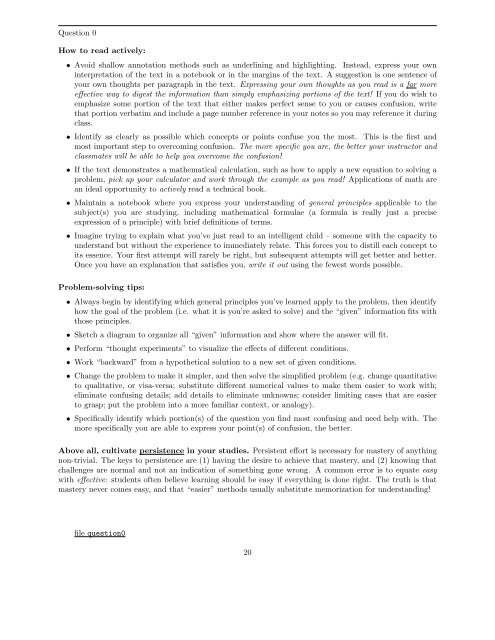INST 262 (DCS and Fieldbus), section 2 Lab Automatically ...
INST 262 (DCS and Fieldbus), section 2 Lab Automatically ...
INST 262 (DCS and Fieldbus), section 2 Lab Automatically ...
Create successful ePaper yourself
Turn your PDF publications into a flip-book with our unique Google optimized e-Paper software.
Question 0<br />
How to read actively:<br />
• Avoid shallow annotation methods such as underlining <strong>and</strong> highlighting. Instead, express your own<br />
interpretation of the text in a notebook or in the margins of the text. A suggestion is one sentence of<br />
your own thoughts per paragraph in the text. Expressing your own thoughts as you read is a far more<br />
effective way to digest the information than simply emphasizing portions of the text! If you do wish to<br />
emphasize some portion of the text that either makes perfect sense to you or causes confusion, write<br />
that portion verbatim <strong>and</strong> include a page number reference in your notes so you may reference it during<br />
class.<br />
• Identify as clearly as possible which concepts or points confuse you the most. This is the first <strong>and</strong><br />
most important step to overcoming confusion. The more specific you are, the better your instructor <strong>and</strong><br />
classmates will be able to help you overcome the confusion!<br />
• If the text demonstrates a mathematical calculation, such as how to apply a new equation to solving a<br />
problem, pick up your calculator <strong>and</strong> work through the example as you read! Applications of math are<br />
an ideal opportunity to actively read a technical book.<br />
• Maintain a notebook where you express your underst<strong>and</strong>ing of general principles applicable to the<br />
subject(s) you are studying, including mathematical formulae (a formula is really just a precise<br />
expression of a principle) with brief definitions of terms.<br />
• Imagine trying to explain what you’ve just read to an intelligent child – someone with the capacity to<br />
underst<strong>and</strong> but without the experience to immediately relate. This forces you to distill each concept to<br />
its essence. Your first attempt will rarely be right, but subsequent attempts will get better <strong>and</strong> better.<br />
Once you have an explanation that satisfies you, write it out using the fewest words possible.<br />
Problem-solving tips:<br />
• Always begin by identifying which general principles you’ve learned apply to the problem, then identify<br />
how the goal of the problem (i.e. what it is you’re asked to solve) <strong>and</strong> the “given” information fits with<br />
those principles.<br />
• Sketch a diagram to organize all “given” information <strong>and</strong> show where the answer will fit.<br />
• Perform “thought experiments” to visualize the effects of different conditions.<br />
• Work “backward” from a hypothetical solution to a new set of given conditions.<br />
• Change the problem to make it simpler, <strong>and</strong> then solve the simplified problem (e.g. change quantitative<br />
to qualitative, or visa-versa; substitute different numerical values to make them easier to work with;<br />
eliminate confusing details; add details to eliminate unknowns; consider limiting cases that are easier<br />
to grasp; put the problem into a more familiar context, or analogy).<br />
• Specifically identify which portion(s) of the question you find most confusing <strong>and</strong> need help with. The<br />
more specifically you are able to express your point(s) of confusion, the better.<br />
Above all, cultivate persistence in your studies. Persistent effort is necessary for mastery of anything<br />
non-trivial. The keys to persistence are (1) having the desire to achieve that mastery, <strong>and</strong> (2) knowing that<br />
challenges are normal <strong>and</strong> not an indication of something gone wrong. A common error is to equate easy<br />
with effective: students often believe learning should be easy if everything is done right. The truth is that<br />
mastery never comes easy, <strong>and</strong> that “easier” methods usually substitute memorization for underst<strong>and</strong>ing!<br />
file question0<br />
20


